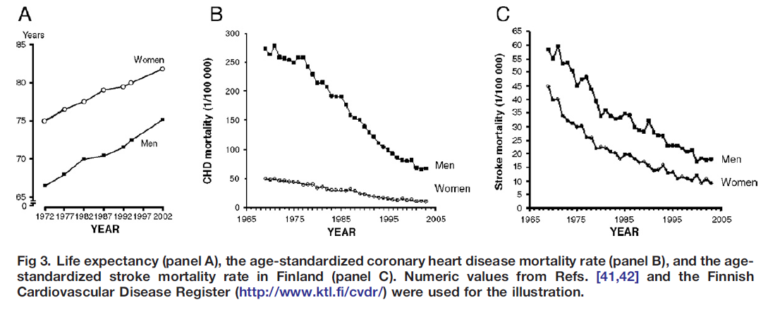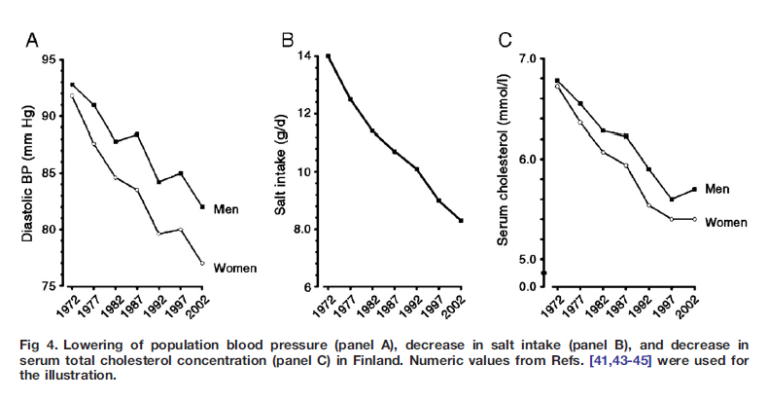Introduction
Dr Kenwyn Nicholls wrote a letter to the editor of the Newsday local newspaper titled ‘TT Moves falls short on NCD Strategy’.
This blog post is a response to that letter
TT Moves - direct response to NCD prevalence
In the letter, Dr Nicholls discusses the TT Moves campaign launched by the Minister of Health, Honorable Terrance Deyalsingh on World Health Day in 2019.
TT Moves is an offshoot of the Caribbean Moves concept, which was initiated in New York in September 2018 to breathe new life into the 14 points of agreement in the 2007 Port of Spain Declaration (PoSD): Uniting against the Epidemic of Chronic Non-Communicable Diseases.

Dr Nicholls' opinion of TT Moves
Dr Nicholls believes that success in reducing premature morbidity and mortality from chronic disease requires an integrated approach that focuses on major risk factors and primary, secondary and tertiary prevention, health promotion, and collaboration across sectors and disciplines.
My opinion
I agree that the National Strategic Plan for Control and Prevention of NCDs 2017-2021 encapsulates this integrated approach, while TT Moves does not. In its present format, I believe that TT Moves is set up for failure given the current state of affairs in Trinidad and Tobago.
Although it may not be the intention of the Ministry of Health in its promotion of the TT Moves campaign, some individuals can interpret a sinister message in the rhetoric of the campaign.
“Drink more water; Get moving; Eat fruits and vegetables” all seem like innocent encouragements. However, it can be implied that it’s the individual’s fault if one does not do these things and ends up with an NCD.
Therefore, TT Moves relies on the idea of personal responsibility, which is unfortunately the solution to the chronic disease epidemic in the minds of many medical practitioners, health, and fitness professionals, legislators and the general public.
Unfortunately, it isn't only healthcare professionals that have this mindset. Politicians, health & fitness professionals and the general public seem to be prone to this slant#diabetes #mentalhealth #TrinidadandTobago #personalresponsibility pic.twitter.com/eTOqwHXiI8
— Spencer's Whole Foods Plant Based Eats and Treats (@SpencersWFPB) April 7, 2024
It’s unfortunate that this mindset still exists.
Does Personal Responsibility alone work?
How successful has the concept of personal responsibility been in motivating health and wellness?
I have addressed this in a previous blog post, but this slant is so pervasive in society that it bears repeating.
National Geographic researcher Dan Buettner identified hotspots of longevity throughout the world and found that longevity was not a result of the wilful intent of individuals but a result of an environment that fostered such a lifestyle.
@danbuettner 42% of Americans are obese – and our food environment is mainly to blame. #bluezones #longevity #biohacking #bluezonesecrets #netflixbluezones #diet #healthydiet #obese #obesity ♬ original sound - Dan Buettner
The people from Blue Zones, the locations in the world with the highest concentration of centenarians and people who had grown old with low incidence rates of chronic diseases such as heart disease, obesity, cancer and diabetes, did not decide in middle age to pursue longevity through a change in diet, taking up exercise, or finding some nutritional supplement. The longevity occurred because they were in the right environment.
@danbuettner 70% of Americans are obese. In Blue Zones, only 1% are obese. Here’s what they do differently. #bluezones #longevity #health #wellness #obesity #aging #america ♬ original sound - Dan Buettner
Environment and Health in Trinidad & Tobago
In Trinidad & Tobago, and by extension, the Caribbean, the environment is not health-promoting, but, as termed by local medical and health professionals, an “obesogenic environment” with good reason.
Sodas cost less than many fruits and fast food outlets abound, with one fast food establishment having sixty outlets nationwide
Not to be outdone is the proliferation of food carts that operate during the day, late night and early morning periods offering foods that are high in sugar, fats or salt or combinations of these three food ingredients.
Many local dishes are also high in sugar, salt, and fats, and may very well be contributing to the chronic disease epidemic Trinidad and Tobago is facing. So as the saying goes, “The proof is in the pudding”. To achieve health in the country, a Trinidad and Tobago citizen has to fight against strong environmental headwinds.
This is why public health campaigns that focus on changing human behaviour that appeals to one’s sense of individual responsibility will not work. The evidence from other countries that constructed public health campaigns around individual responsibility indicates very limited, short-term success. Over time, people reverted to their pre-campaign behaviours.
The only recent public health campaign that has worked on a large scale and has boasted positive long-term results in Finland.
How Finland got healthier by changing food environment with policy
Since the early 1970s, industrially manufactured food items, meals, and canteen foods played a major role in the total intake of salt in Finland. It was determined by Finnish legislators that the only effective way to produce a definitive decrease in population salt intake was to reduce the salt levels in industrially manufactured fast foods, other food items and canteen foods.
The Ministry of Trade and Industry, in cooperation with the Ministry of Social Affairs and Health, prepared new salt-labeling regulations in the early 1990s, with full implementation since June 1, 1993. The legislation applied to all food item categories that made major contributions to salt intake in the average Finnish diet.
This resulted in a population salt intake drop from 14 g/d to just over 8 g/d, over 10 mm Hg drops in both systolic and diastolic blood pressure and life expectancy increased by over 5 years in both men and women. There was also an 80% decrease in death due to cardiovascular disease and strokes in the middle-aged Finnish population. This is a clear example of how the health of a population can be improved by changing the environment.


Trinidad and Tobago's food environment approach
I believe this example is fitting because in Trinidad & Tobago, hypertension, or ‘pressure’ in local parlance, is one of the major health issues in Trinidad & Tobago.
However, up to the time of writing (April 2024), there has not been a major national conversation about the salt intake of the population by the health authorities (although there have been mentions of it here and there)
Interestingly, Action Item 1.3.2 of the National Strategic Plan for Prevention and Control of NCDs talks about establishing baseline sodium and trans fat intake of the population.
Having this baseline data is critical to the initiation of any large-scale intervention of population salt intake to achieve any sodium reduction target. Interventions to achieve sodium reduction targets are addressed in the National Strategic Plan. TT Moves does no such thing.
Regarding hypertension, TT Moves advocate for individual screening and treatment aka “Know Your Numbers”

However, nothing much is mentioned about how to prevent hypertension from taking root initially.
TT Moves alone will not work
The TT Moves campaign is a step in the right direction in terms of making the population aware of simple habits to begin the journey towards a healthier life.
However, it cannot be the stand-alone flagship program of the Ministry of Health if the Government desires to decrease incidence rates of chronic disease. It must be supported by a health-promoting environment, which is not present in Trinidad & Tobago and by all indications, looks like there won’t be much noticeable improvement soon.
Barbados: Public Health campaign + policy interventions
By contrast, Barbados has a similar campaign to the TT Moves campaign called Barbados Moves.
However, Barbados has been actively striving to make its environment more health-promoting, mainly through policy actions.
Barbados implemented a sugar-sweetened beverage tax of 10% in 2015 and doubled the tax rate in 2022.
#Barbados will have an increase in the excise tax on sugar-sweetened beverages. The @who recommended 20% tax will be implemented shortly as stated by Prime Minister @miaamormottley in this evening's budget presentation @hsfbarbados @senatorcrystal @CheyneJoness pic.twitter.com/sYJdKYeHrp
— HCC (@HealthCaribbean) March 15, 2022
In 2023, Prime Minister Mia Mottley hinted at a sodium tax during the Budget Presentation. Legislative actions such as these can help campaigns such as Barbados Moves have a greater impact on chronic disease incidence and control.
@miaamormottley in the 2023 Barbados budget presentation highlights the scourge of NCDs plaguing the population and the impending sodium tax implementation pic.twitter.com/ETK830InUL
— Spencer's Whole Foods Plant Based Eats and Treats (@SpencersWFPB) March 28, 2024
Final thought
For TT Moves to have any long-term success, the campaign has to be supported by a health-promoting environment created via policies and their implementation.
References
- Karppanen, H., & Mervaala, E. (2006). Sodium intake and hypertension. Progress in cardiovascular diseases, 49(2), 59–75. https://doi.org/10.1016/j.pcad.2006.07.001
- Karppanen, H., & Mervaala, E. (2006). Sodium intake and hypertension. Progress in cardiovascular diseases, 49(2), 59–75. https://doi.org/10.1016/j.pcad.2006.07.001
- Trinidad & Tobago Ministry of Health website (https://health.gov.tt/wellness-tips-hypertension)





